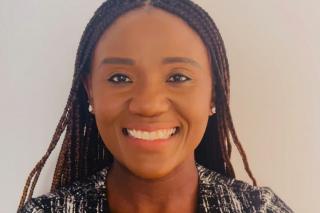When Mbita Mbao ’22PhD was looking for a doctoral program in social work, Simmons met all of her requirements: a Boston location and the ability to take all of her in-person classes in one day per week. More important than these criteria, Simmons had Dr. Johnnie Hamilton-Mason, Interim Director of the School of Social Work.
“Professor Hamilton-Mason and I met and talked about the program, and we just clicked,” recalls Mbao. “I knew I wanted to work with Dr. Johnnie. As a woman of color and an immigrant [from Zambia], it was important for me to have someone of color on the faculty who could mentor me.”
Mbao came to Simmons with years of clinical experience with older adults. Her research interests include aging, mental health, and immigrant health. “I started working with older adults as a CNA [certified nursing assistant] in nursing homes. I was a home health aid during my undergraduate studies at Bowling Green State University in Ohio, and I’ve always been passionate about the population. When I graduated, I knew that I wanted to work with older adults. It’s a population that most young people don’t consider. Even when it comes to research, [older adults] are often forgotten.”
Born in Zambia, Mbao comes from a culture where older adults receive care from family members at home. “When I first moved to the U.S., the whole idea of nursing homes was a foreign concept for me,” she recalls. “When I started working in nursing homes, I was curious about why anyone would send their loved ones to a home. I talked to older adults in the nursing home, some who had family who visited on the weekends, some once a month, and some who didn’t visit at all. Where I grew up, these people were valued — younger individuals approached older adults for wisdom and advice. That was where my passion [to care for older people] strengthened.”
Now, Mbao shares this passion with her students at Salem State University, where she created an elective course about aging. “There is a huge need for social workers to work with older adults,” notes Mbao. While less than 4% of social workers currently work with older adults, social workers are one of only two mental health providers who generally accept Medicare, which most people 65 and older have as their insurance.
Mbao opens her elective course with a question: when you think about aging, what do you envision? “A lot of students think of someone who is in their 80s or 90s. They don’t want to work with older adults because they don’t want to think about death.” Mbao shares her experience of working in her clinical practice with adults over the age of sixty, most of whom struggle with substance use, anxiety, and depression. “When I share my experiences, the [students’] mindsets shift. It’s not just hospice work with dying people.” Mbao invites speakers to each class, sharing the different roles available for those working with an aging population. After taking her class, 80% of her students reported that they were considering working with older adults. “I love that part of the work, having students see the possibilities.”
Clinically, she’s happy to provide support that few other clinicians offer, including home visits to accommodate older adults who don’t drive. Her current research focuses on the intersection of aging and disability. “We are partnering with two aging services access points, looking at how care managers at these two agencies conceptualize successful aging for older adults who are aging with a disability.” Mbao feels that the concept of successful aging needs to be tailored for older people with disabilities that may inhibit mobility. “They are told to exercise and be active,” says Mbao, noting that disabilities may make this challenging for some older adults. “With the current conceptualization of successful aging, it makes it seem as though older adults with disabilities are not aging successfully due to their limited mobility.”
As for Mbao, she feels that Simmons provided her with the tools she needs to be a researcher and a successful tenure-track professor. She still draws regularly on topics she learned in her teaching methodology course, including course design, assessment, and equitable learning environments. Learning theory and practice at Simmons prepared her to teach adults in the classroom, and her studies boosted her research skills. “I love qualitative research, thanks to Dr. Johnnie.” Mbao also credits Adjunct Professor Tamara Cadet and Associate Professor Joanna Almeida for supporting her developing research skills.
Mbao encourages potential PhD students to be open-minded when beginning their studies. “Be open to feedback,” she says. “When I first came [to Simmons], I was set on researching substance use issues in sub-saharan African Immigrants. During the first semester, I wrote a paper on this topic and I still remember Professor Peter Maramaldi telling me the topic was too broad. Though I was passionate about my topic, I changed to work on “Aging workforce development.”
The advice I give potential PhD students is the same advice I was given. The PhD program is an opportunity to learn how to conduct research and the dissertation study is an opportunity for you to demonstrate that you can use all the knowledge and skills you have learned in the programs and be an independent researcher. You have the rest of your life after you graduate to conduct groundbreaking research.
Read more about Mbao’s research while at Simmons.

